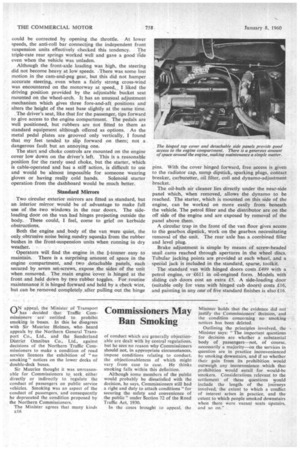Commissioners May Ban Smoking
Page 80

If you've noticed an error in this article please click here to report it so we can fix it.
(IN appeal, the Minister of Transport
has decided that Traffic Cornmissioners are entitledto prohibit smoking in buses. In this he disagrees with Sir Maurice Holmes, who heard appeals by the Northern General Transport Co., Ltd., and the Sunderland District Omnibus Co., Ltd., against decisions of the Northern Traffic Commissioners to make a condition of road service licences the exhibition of "no smoking" notices on the lower decks of double-deck buses.
Sir Maurice thought it was unreasonable for Commissioners to seek either directly or indirectly to regulate the conduct of passengers on public service vehicles. Smoking was an aspect of the conduct of passengers, and consequently he deprecated the condition proposed by the Northern Commissioners.
The Minister agrees that many kinds E16 of conduct which are generally objectionable are dealt with by central regulations, but he sees no reason why Commissioners should not, in appropriate circumstances, impose conditions relating to conduct, the objectionableness of which might vary from case to case. He thinks smoking falls within this definition.
Although some members of the public would probably be dissatisfied with the decision, he says, Commissioners still had a right and duty to attach conditions " for securing the safety and convenience of the public" under Section 72 of the Road Traffic Act, 1930.
In the cases brought to appeal, the
Minister holds that the evidence did not justify the Commissioners' decision, and the condition concerning no smoking notices has been deleted.
Outlining the principles involved, the Minister says: "The important questions for decision are whether a substantial body of passengers—not, of course, necessarily a majority—on the services in question are in practice inconvenienced by smoking downstairs, and if so whether their gain from its prohibition would outweigh any inconvenience which that prohibition would entail for would-be smokers. Considerations relevant to the settlement of these questions would include the length of the journeys involved, the extent to which a conflict of interest arises in practice, and the extent to which people smoked downstairs when there were vacant seats upstairs, and so on."
























































































































































